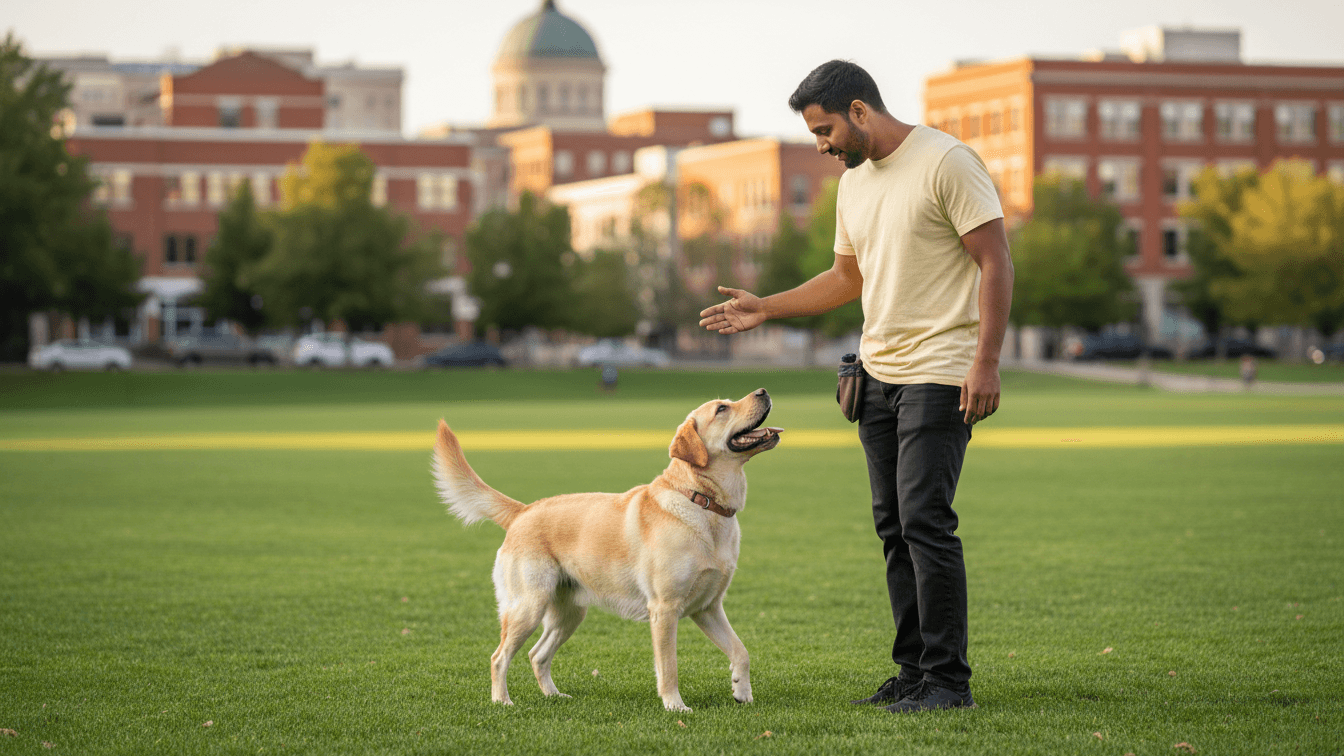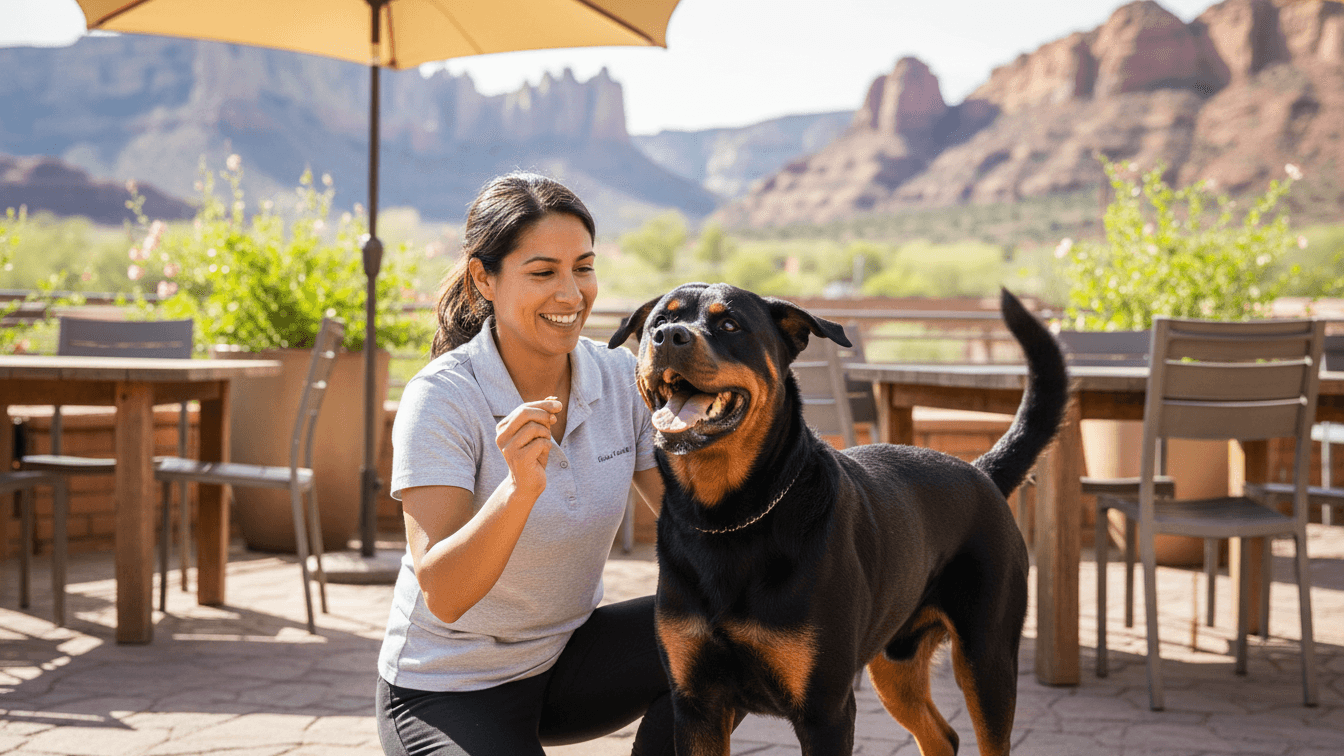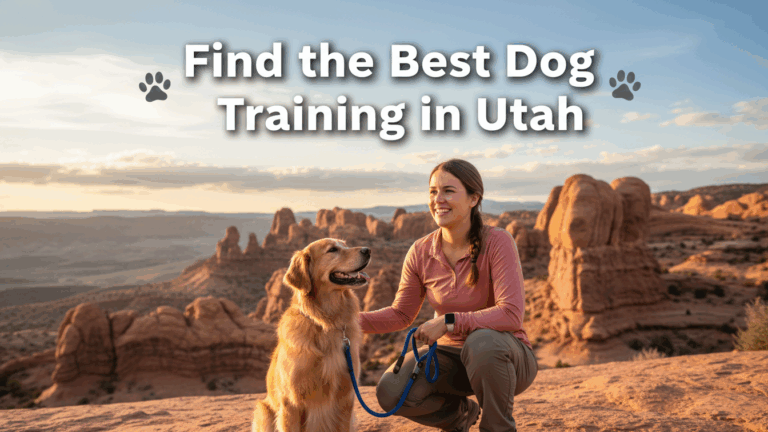Your Complete Guide to Choosing a Dog Trainer in Utah
Finding the right professional dog trainer in Utah means working with someone who understands the unique challenges of raising a well-behaved dog in the Beehive State. From managing reactivity on crowded Wasatch Front trails to practicing recalls in high-altitude parks, your dog needs skills that translate to real Utah life.
Utah’s landscape brings specific challenges. You’ll encounter off-leash dogs on multi-use trails, wildlife distractions in foothill neighborhoods, and busy ski resort towns where your dog needs to stay calm around crowds. The right trainer will help you navigate these scenarios while building skills that work everywhere from city sidewalks to mountain trailheads.
How to Choose the Right Trainer
Start by looking for someone who uses positive reinforcement training methods and understands Utah’s outdoor lifestyle. Your dog should learn to stay focused near mountain bikers, ignore squirrels and deer, and handle crowded farmers markets without pulling or jumping.
Credentials matter when comparing trainers. Look for dog trainer certifications like CPDT-KA, KPA-CTP, or IAABC-CDBC for behavior issues. For serious aggression or fear problems, consider trainers with CBCC-KA credentials or those who’ve completed programs like CTC.
In-home dog training works well for puppy manners, door behavior, and basic obedience skills you’ll use around your neighborhood. Group classes make sense once your dog can focus around distractions, especially before visiting busy spots like Liberty Park or Sugarhouse Park.
Ask about a free consultation or free evaluation before committing. This gives you a chance to meet the trainer, discuss your goals, and see if their approach matches what you need.
Common Dog Training Methods Explained

Reward-based training builds trust while creating lasting behavior changes. These methods also help you meet Utah’s requirements for keeping dogs under control in public spaces.
Basic obedience covers sit, down, stay, recall, and leash training so your dog can handle everything from neighborhood walks to brewery patios. These foundational skills prevent problems before they start.
Puppy training focuses on socialization, potty training, bite inhibition, crate comfort, and early leash skills. Starting young prevents bad habits and helps puppies adjust to Utah’s active lifestyle.
Behavior modification addresses reactivity, separation anxiety, resource guarding, and fear through careful desensitization work. For complex cases, expert dog trainers often coordinate with veterinarians to rule out medical issues.
Private lessons let you customize training sessions around your specific challenges. Whether you’re dealing with wildlife distractions or teaching your dog to stay calm during ski season crowds, one-on-one coaching adapts to your needs.
Dog training classes provide structured socialization and help your dog practice good manners around other dogs. The best group classes screen participants carefully, give dogs plenty of space, and focus on calm behavior rather than excitement.
Board and train programs can accelerate results when you’re short on time. Your dog stays with the trainer for intensive daily sessions, then you learn how to maintain the progress through handoff lessons.
Specialized work like service dog training or therapy dog training requires extra precision, public-access skills, and a clear step-by-step training program. Not all trainers offer these services, so ask about experience with these specific goals.
Avoid trainers who rely on fear, pain, or intimidation. Humane training methods are safer, more effective long-term, and won’t damage your relationship with your dog.
Average Cost of Dog Training in Utah (Updated for 2025)
Dog training services in Utah vary based on the trainer’s experience, session length, and location. Urban areas along the Wasatch Front typically run slightly higher than rural communities. Here’s what most Utah dog owners are paying in 2025.
| Service Type | Average Cost (Utah) |
|---|---|
| Puppy classes (4-6 weeks) | $140-$260 total |
| Group obedience classes (4-6 weeks) | $150-$285 total |
| Private lessons (60-90 min) | $100-$180 per session |
| In-home training packages (4-6 visits) | $400-$850 total |
| Day training (per week) | $425-$900 |
| Behavior consultation (initial) | $140-$240 |
| Board and train (2-4 weeks) | $1,900-$4,200 total |
Trainers in Salt Lake, Utah, and Davis counties often charge toward the higher end of these ranges. You may pay additional travel fees for locations outside the main metro corridor.
Make sure you understand what’s included in the total price, how progress gets tracked, and whether follow-up support comes with your training program.
Questions to Ask a Potential Dog Trainer
- What training methods do you use, and how do you keep sessions positive and stress-free?
- What credentials do you hold, and do you pursue continuing education like CPDT-KSA?
- How will you adapt the training plan for my dog’s temperament and our Utah lifestyle?
- Do you offer in-home sessions, group classes, or day training, and which format fits my goals?
- How will we measure progress and know when to add more challenging distractions?
- What are the total costs, including travel fees, and what’s your cancellation policy?
- Do you carry liability insurance, and can you provide proof of coverage?
- For behavior problems, will you work with my veterinarian if needed?
- What should I practice between training sessions to help my dog improve?
- Have you worked with dogs who need to handle Utah-specific challenges like wildlife or altitude?
Local Utah Rules and Considerations
Utah enforces leash laws and animal control regulations to keep parks and neighborhoods safe. Most communities have adopted ordinances that hold owners responsible for their dogs’ behavior in public spaces.
Leash laws apply throughout most of Utah. Dogs must be leashed in city parks, on trails, and in public areas unless you’re inside a designated off-leash dog park. Keep a standard six-foot leash handy for urban areas and state parks.
Utah state law requires current rabies vaccination for all dogs over four months old. Your veterinarian will provide proof of vaccination, and you’ll need to keep this documentation accessible. Find more information through the Utah Department of Health and Human Services.
Barking and nuisance complaints can result in fines or citations. Work with your trainer on alert barking and separation anxiety before neighbors contact animal control.
Utah doesn’t require special licenses for dog trainers. However, businesses that board dogs must follow facility regulations through the Utah Department of Agriculture and Food. If your trainer offers board and train services, ask about their facility licensing.
Many Utah cities require dog licenses. Check with your local animal services office for specific requirements in your community. Salt Lake County residents can find licensing information through Salt Lake County Animal Services.
Some trails and wilderness areas restrict dogs during wildlife breeding seasons. Check current regulations before planning training outings in state parks or national forests.
Local Utah Resources for Dog Owners
These locations give you safe spaces to practice obedience training, work on socialization, and provide enrichment for your dog. Always follow posted rules and clean up after your pet.
- Herman Franks Park in Salt Lake City offers fenced areas where you can work on off-leash recalls and practice calm greetings during quieter hours
- Tanner Park in Salt Lake City provides separate sections for large and small dogs with water stations and shaded areas
- Jordan Park in Salt Lake City features a fully fenced dog park that’s perfect for controlled socialization work
- Millcreek Canyon allows off-leash dogs on odd-numbered days, giving you excellent opportunities to practice trail manners and recalls around hiking distractions
- Sugar House Park welcomes leashed dogs on walking paths where you can work on loose-leash walking around joggers, cyclists, and families

FAQs
How much does in-home dog training cost?
Most Utah trainers charge $100-$180 per in-home session. Package deals typically offer better value, with four to six visits ranging from $400-$850 total.
Is in-home dog training worth it?
Yes, because you’re addressing problems exactly where they happen. Your trainer can help with door manners, jumping on guests, counter-surfing, and window reactivity right in your home, then move outside to practice leash skills on your actual walking routes.
Can you pay someone to house train your dog?
Absolutely. Many trainers offer puppy training packages that include potty training schedules, crate training, and management strategies. Day training can speed up the process while teaching you how to maintain consistency.
What is the 3-3-3 rule for dog training?
This guideline suggests that new or adopted dogs need roughly three days to decompress, three weeks to learn your routines, and three months to feel fully settled. Effective training programs account for this natural adjustment period.
How long will it take to reach my training goals?
Most friendly dogs show solid progress within four to eight weeks with consistent daily practice. Behavior modification for reactivity, aggression, or fear typically requires several months of gradual work with careful exposure to triggers.
What should I bring to group classes?
Pack a flat collar or harness, a six-foot leash, high-value treats, water, poop bags, and current vaccination records if requested. Leave retractable leashes at home for safety reasons.
What’s the leash law in Utah?
Most Utah cities require dogs to be leashed in public spaces unless you’re inside a designated off-leash area. Leash requirements apply to city parks, trails, and sidewalks throughout the state.
Do I need a dog license in Utah?
Licensing requirements vary by city. Many Utah communities require annual dog licenses, which help reunite lost pets with owners and fund animal services. Check with your local animal control office for specific requirements.
What shots does my dog need in Utah?
Utah law requires rabies vaccination for all dogs over four months old. Your veterinarian will also recommend core vaccines like distemper-parvo and may suggest bordetella or leptospirosis based on your dog’s lifestyle and exposure risks.
Are dog trainers required to be licensed in Utah?
Utah doesn’t require special licenses for dog trainers. However, if a trainer operates a boarding facility as part of board and train services, the facility must meet state regulations through the Utah Department of Agriculture and Food.
Where can I practice off-leash recall?
Use fully fenced dog parks like Herman Franks Park or Tanner Park to keep practice sessions safe and legal. Millcreek Canyon allows off-leash dogs on odd-numbered days, but start with fenced areas until your dog has a solid recall.
Which dog parks allow training around Utah?
Herman Franks Park, Tanner Park, and Jordan Park in Salt Lake City all welcome dogs for training practice inside their fenced boundaries. Visit during off-peak hours when you’re working on new skills.
What trails allow dogs for training?
Most Utah state parks welcome leashed dogs on trails. Millcreek Canyon offers off-leash access on odd-numbered days, making it popular for recall practice. Antelope Island State Park allows leashed dogs on trails where you can work on focus around wildlife and wide-open spaces.
How do I find a certified dog trainer in Utah?
Look for trainers who hold credentials from recognized organizations. Ask about their certification status and whether they pursue ongoing education to stay current with modern, science-based training methods.
What if my dog is reactive on Utah trails?
Work with a professional dog trainer who has experience with behavior modification. Start training sessions in low-distraction environments, then gradually increase difficulty. Many reactive dogs improve significantly with consistent desensitization work and proper management.
Can I train my dog to hike off-leash safely?
Yes, but start with a strong foundation in basic obedience and recall before attempting off-leash hiking. Practice in fenced areas first, then move to long-line work on quiet trails. Remember that many Utah trails require leashes regardless of your dog’s training level.
The right combination of skilled guidance, humane methods, and consistent practice will help your dog become a confident companion ready for Utah’s active lifestyle. Whether you’re preparing for city life or mountain adventures, working with expert dog trainers who understand local challenges makes all the difference in raising a top dog.
